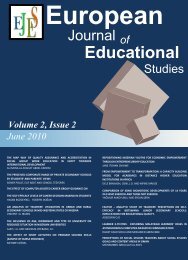Download complate issue - Ozean Publications
Download complate issue - Ozean Publications
Download complate issue - Ozean Publications
- No tags were found...
You also want an ePaper? Increase the reach of your titles
YUMPU automatically turns print PDFs into web optimized ePapers that Google loves.
<strong>Ozean</strong> Journal of Social Sciences 2(3), 2009ISSN 1943-2577© 2009 <strong>Ozean</strong> PublicationHow Libraries Contribute to Communities and SocietyJ. A. AbolajiDeputy University LibrarianJoseph Ayo Babalola UniversityIkeji-ArarkejiP. M. B. 5006,Ilesa, NigeriaE-mail address for correspondence : jabolaji@yahoo.com._____________________________________________________________________________________________Abstract : This paper discusses the roles of library as a unifying factor in the community.It argues that though the school library in a rural area should focus on its primary clientele, it should also extend itsservices and resources to other residents of the community in which it is located. The paper then gives a briefdescription of the development of mobile and rural libraries in England, United States and Nigeria.The efforts of some university libraries to achieve the same goal are discussed. It argues that the university librariescan do better in communities where library services are poor or not available. It also discusses how the advent ofthe ICT has transformed library services.__________________________________________________________________________________________INTRODUCTIONThe modern library is not only a collection of textbooks. It includes other sources like reference materials, booksrelating to school curriculum, general books not relating to a specific subject area, periodicals, newspapers, audiovisualmaterials, government publications and electronically stored and retrievable materials. These resources enablelibraries to play a crucial role in the success of lifelong education of communities and society in general.It is a well known fact that education at certain levels goes beyond the normal teacher–student or classroom–studentrelationship. Students who really intend to acquire substantial knowledge must work independently in their searchby using reference materials and other sources available in the library. Apart from being agents of educationalchange, libraries serve other purposes like economic, social, political and recreational changes because they containthe written history, culture and knowledge of the human race.In Nigeria and other developing countries of Africa, government objectives include (a) life-long education for thecitizens as the basis for the nation’s educational policy (b) emphasis on the use and improvement of moderneducational techniques at all levels of the educational system (c) the structuring of education system to develop thepractice of self learning (d)making the people to become actively literate and generally well-informed (e) theintroduction of universal basic and compulsory education for all citizens. In this regard, the African NetworkCampaign for Education for All (ANCEFA) stresses the need for serious focus on and investment in formaleducation and non-formal education like adult literacy programmes and youth training centres to tackle the literacycrisis (Olanrewaju 2009). These objectives can be easily achieved with the aid of well-stocked and equippedlibraries in primary, secondary and tertiary institutions in addition to the maintenance of public, rural and mobilelibraries across the country. Let us now examine how these libraries can help in the realization of these objectives.197
















